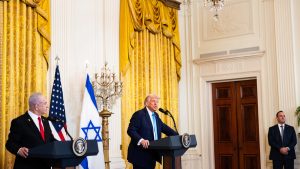
By January 28, Donald Trump signed 37 executive orders, along with less significant memoranda and proclamations, and rescinded 78 of Joe Biden’s executive orders. His actions signal a move toward a unitary executive paradigm, in which the president is empowered to decide without the involvement of other departments of government. Trump has already altered the way America operates, regardless of whether he achieves his objectives.
US President Donald Trump quickly rescinded 78 of his predecessor Joe Biden’s executive actions within days of taking office. These consist of smaller memos and proclamations, as well as presidential orders, which have the most authority. Memoranda and proclamations are more difficult to monitor and enforce than executive orders, which have legal authority and are impossible to reverse.
With executive orders titled “Unleashing American Energy” and “Putting America First in International Environmental Agreements,” Trump essentially withdrew the United States from the Paris Climate Accord by January 28. Republican vice presidential nominee Sarah Palin’s “drill, baby, drill” philosophy is being revived by these efforts. She ran on a platform supporting the exploitation of natural gas and petroleum in 2008. At the expense of international cooperation, they also signal a return to policies that unilaterally claim American sovereignty.
Conservatives have been strengthened by several court rulings throughout the years. The conservative viewpoint, which has changed American democratic institutions, has been reinforced and rationalized by Chief Justice John Roberts. It can be argued that the Bush v. Gore (2000) Supreme Court decision effectively gave George W. Bush an election victory, echoing neoconservative ideology.
Furthermore, Trump’s current plan is similar to Republican Grover Norquist’s effort to cut the federal government in half during the 1980s. In order to avoid the stalemate that checks and balances currently create, Norquist advocates the unitary executive doctrine, which holds that the president must have unrestricted authority. Since the US is now a superpower, unlike in the 18th century, presidents need to be able to move quickly and decisively in the best interests of the country.
Philosophers like John Hobbes, who supported a strong executive branch to uphold social order, are the origins of Norquist’s theories. Trump’s administration is reviving this Hobbesian worldview at a time when regulatory capture and bureaucratic inefficiencies have undermined public confidence in institutions.

The transition to a unitary executive
Before Norquist, the idea of a unitary executive existed. According to this idea, the president has become a key figure in US governance and has the authority to make decisions and carry them out without intervention from the legislative or judicial arms of government. Carl Schmitt, a German legal scholar and Adolf Hitler’s personal attorney who promoted centralizing power, is credited with coming up with this concept.
The unitary executive has been adopted by neoconservatives. They contend that the federal government no longer functions as the Founding Fathers intended and has become invasive and ineffective. They support a more efficient administration and oppose decentralization. Within this broader context, Trump’s assertive exercise of executive authority makes sense.
The whole essence of American democracy is being altered by Trump. His activities have profoundly changed the political and social landscape, even if his exact goals don’t succeed—many won’t. Trump has changed the US government’s structure, expectations, and rhetoric, making it more authoritarian. This action is supported by public support for a strong, determined leader. According to polls, more than 40% of Americans strongly prefer strong leadership and oppose democratic processes.
Decisive leaders have frequently risen to the task during times of democratic gridlock throughout the past few centuries. Examples include economic crises and times of war. It’s possible that the US is currently going through one of those cyclical periods where Trump intervenes and causes a stir. He might experience criticism for his decisions, which would force the nation to return to a more democratic form of government. Numerous long-overdue reforms, including as tackling gerrymandering, campaign finance, and reevaluating the incredibly brief two-year mandates in the House of Representatives, may also finally be implemented.
Trump’s policies frequently deviate from accepted wisdom, especially when it comes to immigration and birthright citizenship. This is viewed by some as a danger to the nation’s cultural identity. The US’s definition of citizenship may alter as a result of these measures. The essence of America will likewise be altered by them.
The powerful take action
The conservative drive for a more compact, authoritarian government that values simplicity and less meddling in the affairs of its constituents is a key component of Trump’s platform. Nevertheless, the ensuing policies can have unexpected and paradoxical effects. For example, immigration restrictions lead to a labor scarcity, and tariffs raise the value of the dollar. However, politically, they are effective, fostering a climate in which discontent is aimed at the government, reinforcing support for conservative leaders as possible saviors.
A constitutional crisis is emerging as a result of Trump’s demands for increased executive authority. Legal systems may collapse if his government uses unlawful means to impose its agenda, such military intervention at the border. Violent clashes could break out with other branches of government over legal authority, triggering a constitutional crisis.
In terms of foreign affairs, Trump’s unilateral approach reflects a shift toward US isolationism and mercantilism. His policies suggest a return to a more imperial, 19th-century model of international relations, marked by power-driven deals and disregard for legal or ethical obligations. Out goes the rules-based order, in comes the sphere-of-influence style of international relations where power and the perception of power alone is key.
The ancient Greek historian Thucydides once said, “The weak suffer what they must, and the strong do what they can.” Thucydides’s thesis is reflected in Trump’s mindset, particularly his ambition to conquer Greenland, Canada, and Panama.










